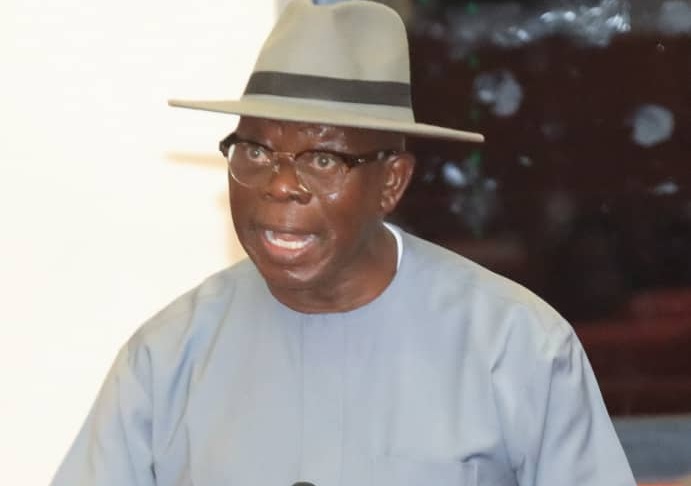FLASHBACK: How Oshiomhole blamed Jonathan for economic crisis when Buhari was in power
Adams Oshiomhole, senator representing Edo North Senatorial District and two-time governor of Edo State, has demonstrated a penchant for blaming Nigeria’s woes on the previous administration or leader at every point in time. Barely after two months former President Goodluck Jonathan handed over government to the immediate past president, Muhammadu Buhari, in 2015, the country […]

oshiomhole
Adams Oshiomhole, senator representing Edo North Senatorial District and two-time governor of Edo State, has demonstrated a penchant for blaming Nigeria’s woes on the previous administration or leader at every point in time.
Barely after two months former President Goodluck Jonathan handed over government to the immediate past president, Muhammadu Buhari, in 2015, the country was plunged into economic crisis. Oshiomhole, then as sitting Edo governor, without mincing words blamed the challenges on what he labelled “recklessness” of Jonathan’s government.
Featuring on Sunrise Daily, a breakfast programme on Channels Television, in July 2015, Oshiomhole had said, “The crisis we have at the moment is not a flash; it’s going to be here for some time. I feel what has happened is that at the peak of the oil boom, prices were high and people made projections and budgets were drawn up on the basis of those numbers and along the line there was a sharp drop.
“So, if the federal government had been stopped from borrowing, the federal government would have defaulted much earlier than the states and the number of months that the federal government would have been worse than the worst state in the federation. The federal government allowed itself to borrow recklessly, quite reckless in the sense that no serious manager goes month after month to borrow for the payment of salaries.”
Oshiomhole to Nigerians: You’re suffering from Buhari’s policies, don’t blame Tinubu
You’re APC’s biggest threat, Amosun blasts Oshiomhole
He added that revelations of the excesses of Jonathan’s administration have been coming into the fore, noting that Buhari had made practical efforts to correct his predecessor’s anomalies.
Oshiomhole not only attacked Jonathan, but he also called for the heads of some of his appointees.
At some point, the former labour leader alleged that Ngozi Okonjo-Iweala, immediate past minister of finance, expended $1 billion on the re-election bid of Jonathan.
Oshiomhole, in blistering attacks on the former minister, described her as a “pathological liar”, re-emphasising the point of the All Progressives Congress (APC) that revelations of the rot of Jonathan’s government would be released in the coming weeks.
“You will soon begin to hear when all the numbers are published,” he said.
After Jonathan Comes Buhari
The former Governor now Senator has again latched on to the current growing hardship in the country and passed the blame on Buhari, who left the government about eight months ago.
Many Nigerians and most especially experts have criticised some of the policies introduced by the President Bola Tinubu-led government that have led to hardship, especially the removal of petrol subsidy, which tripled the pump price of fuel.
But Oshiomhole said President Tinubu should not be held responsible for the right or wrong decisions taken by the previous administration.
Speaking during an interview on Channels TV, Oshiomhole specifically said he always places national interest above partisan interests.
The senator said he criticized Buhari’s government for some of its policies. Oshiomhole was removed as the national chairman of APC in 2020 under the watch of Buhari.
“My first loyalty is to Nigeria. At some point, before the last president left office, I lamented loudly what I saw as reckless policies that were designed to dehumanize the population that was already in pain.
“I felt that it is not what the then president promised. I dissociated myself from those policies and I’m happy that I was not the only one.
“There were governors who approached the court to denounce some of those policies. It is the long term consequences of those policies that we are still grappling with now,” he said.
